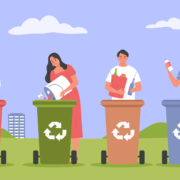Increasing Foodservice Packaging Recycling with FPI’s Community Partnership Program
Imagine a world where your morning coffee cup, last night’s takeaway containers or pizza box doesn’t end up as waste but instead finds a new life through recycling or composting. For many communities across the U.S., this vision is becoming a reality through the Foodservice Packaging Institute’s Community Partnership Program. This ongoing initiative is focused on expanding curbside recycling access for foodservice packaging products, like paper and plastic cups, containers, pizza boxes and paper bags.
Whether you’re an eco-conscious resident or a municipal leader striving to improve your community’s sustainability, this program is a valuable tool in the effort to curb waste and increase recycling.
More communities are recognizing the value of recovering foodservice packaging. However, the acceptance of these materials varies depending on local resources, recycling facilities and community engagement. This means communities must carefully evaluate their ability to add these materials to curbside programs.
For instance, in a city of about 250,000 people, roughly 3,000 tons of foodservice packaging, such as cups, containers, and boxes, are generated each year. The majority—about 75%—is fiber-based (e.g., pizza boxes and paper bags). If the city set an initial annual recovery rate of just 10%, that would equate to 300 tons of recyclable material, with approximately 230 tons being paper and 70 tons being plastic. This initial goal is both realistic and impactful.
Achieving these results requires the right infrastructure, partnerships and education — a trifecta the FPI Community Partnership Program is uniquely designed to support.
The program’s goal is to assist communities in integrating foodservice packaging into their curbside recycling or composting systems. By partnering with vetted municipalities, the program creates models of success that can inspire and guide other regions as they adopt similar practices. The ultimate goal? To make it the norm to see foodservice packaging collected in curbside recycling programs across the nation.
Since its inception, the program’s impact has been striking. Recycling access for foodservice packaging has grown from 547,000 households in 2017 to nearly 7 million households in 2023. This surge represents not just increased access but a rising shift in community mindset about the value of recovering these materials.
Communities partnering with FPI enjoy resources and support to make their recycling programs successful. Here’s how FPI sets communities up for success when adding foodservice packaging recovery programs:
Stakeholder outreach and alignment. FPI collaborates with essential stakeholders, including materials recovery facilities (MRFs), haulers, end markets, composters, and community leaders. This ensures that all pieces of the recycling ecosystem are aligned and equipped to handle food service packaging.
Data collection and analysis. Before and after the program launches, FPI helps communities collect data on the composition of the recycling stream and other program parameters. This allows municipalities to track progress, measure success, and identify areas for improvement.
Communication and education support. Education is critical to any recycling effort, and FPI doesn’t leave this to chance. The program includes a strong communications component to educate residents about which materials can — and can’t — be recycled or composted. This clarity reduces contamination in recycling streams and improves overall program outcomes.
Grant funding opportunities. Selected communities participating in the program may qualify for grant funding, which can be used to refresh and expand resident education initiatives. This funding ensures community members are well-informed about new recycling additions, driving higher participation and success rates.
Seventeen communities—including major cities like Atlanta, Detroit, Tulsa, Chicago and Washington, D.C. — have received funding from this program. These cities serve as models for what’s possible when foodservice packaging is integrated into recycling systems.
One example is Atlanta, where collaboration between FPI, local leaders and MRF operators resulted in expanded recycling capabilities. Now, 10 municipalities, including 350,000 area residents, can recycle paper cups through their community curbside recycling program. Initiatives like these demonstrate the scalability and adaptability of the program, paving the way for more cities to follow suit.
For municipal leaders, the first step is exploring the feasibility of adding foodservice packaging to your curbside program. Partnering with FPI provides access to the technical expertise, funding support and educational resources needed to ensure a smooth rollout and continued success.
For eco-conscious residents, your role is equally important. Stay informed about what can be recycled in your community, participate in recycling efforts and advocate for programs like the Community Partnership Program. Your voice can influence local leaders to explore the adoption of more sustainable practices.
Cities across the nation are already increasing their recovery options. Could yours be next? We know that together, we can turn small changes — like recycling your morning coffee cup—into a big impact.
Interested in bringing foodservice packaging recycling to your community? Learn more about FPI’s Community Partnership Program and how to get started.




Leave a Reply
Want to join the discussion?Feel free to contribute!